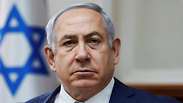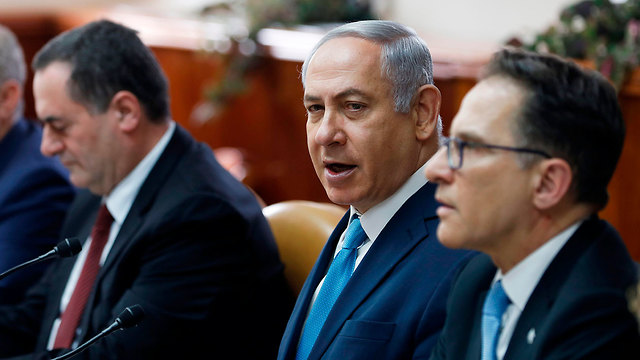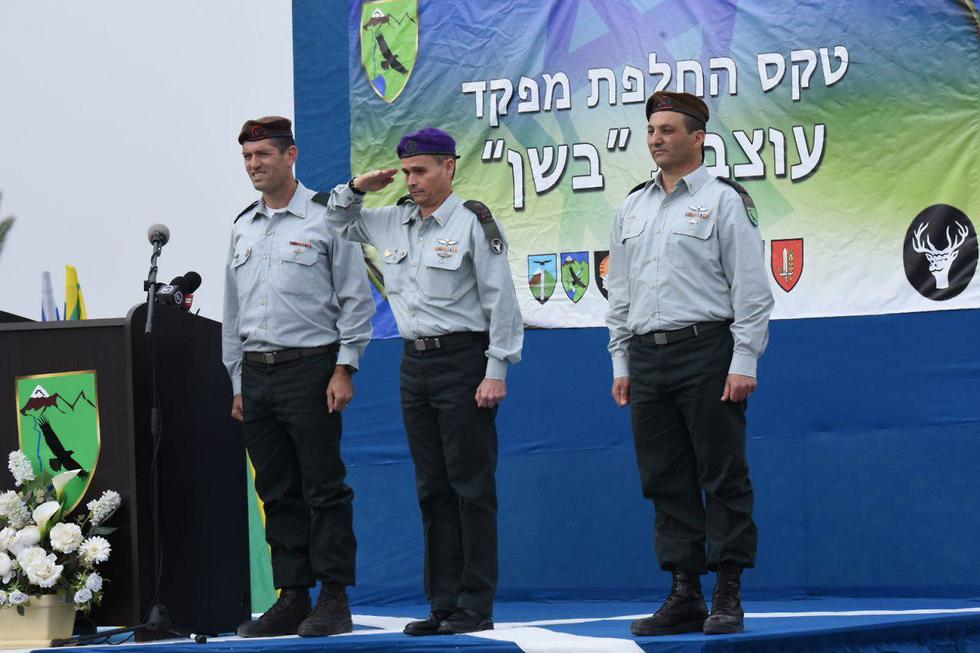

Netanyahu: Airstrikes dealt 'severe blows' to Iran, Syria
PM Netanyahu says IDF has dealt 'severe blows' to the armed forces of Iran and Syria with a Saturday's series of airstrikes on Syrian soil; 'We will continue to thwart any attempt to harm us. That was our policy and this will remain our policy,' he adds.
Prime Minister Benjamin Netanyahu addressed Saturday's interception of Iranian drone, IAF strike in Syria and downing of an Israeli F-16 in Sunday's Security Cabinet meeting, telling cabinet ministers the IDF "dealt severe blows to the armed forces of Iran and Syria."
"We made it unequivocally clear to everyone that our rules of action have not changed one bit; we will continue to strike at every attempt to strike at us. This has been our policy and it will remain our policy," he asserted.
Netanyahu told the ministers that he had spoken before the cabinet meeting with the navigator who was lightly wounded in Saturday's incident.
"I was glad to hear that he was on his feet, literally, and I was pleased to hear that the pilot's condition has improved," he said, wishing both a speedy and full recovery.
Housing and Construction Minister and former commander of the IDF's Southern Command Yoav Galant stressed at the meeting that "the center of the problem in the Middle East is Iran. It created an axis of evil: Iran-Hezbollah-Syria.
"We will break this axis of evil. On Saturday we set very clear red lines on the matter," he added, saying Israel is "not only talking but acting."
"There will be no infiltration of any unmanned or manned aerial vehicle into Israeli airspace without a response. Those who send them put themselves in danger, and I think that the Syrians also understand very well now that the fact that they are hosting the Iranians on their soil is causing them great harm," Galant summarized.
"They, and we, know what we hit and it will take them some time for them to digest, understand and ask how Israel knew how to hit those sites," Intelligence Minister Yisrael Katz told Army Radio. "These were concealed sites and we have intelligence agencies and the ability to know everything that is going on there and yesterday we proved that."
GOC Northern Command Maj. Gen. Yoel Strick on Sunday said "Iran wants to create a front command in Syria," and Israel will "not allow it."
Strick, the first IDF commander to publically address Saturday's events, warned at an IDF promotion ceremony that "whoever crosses the border in will receive an appropriate response."
According to him, "Iranian involvement in the region is a disturbing threat to Israel and the entire world," though he clarified that, despite that, Israel does not seek to escalate the situation.
Saturday's airstrikes marked the toughest Israeli aerial assault in Syria in decades.
The Syrian Observatory for Human Rights, which monitors the war in Syria through a network of activists on the ground, said Sunday that at least six Syrian troops and allied militiamen were killed in the airstrikes. The six included Syrian and non-Syrian allied troops, the Britain-based Observatory said.
In Saturday's attacks, the Israeli jets came under heavy Syrian anti-aircraft fire and the pilots of one of the F-16s had to eject before the plane crashed in northern Israel. One pilot was seriously wounded and the other one lightly.
Israel would not confirm whether its aircraft was shot down by enemy fire, which would mark the first such instance for Israel since 1982, when it was fighting a war in neighboring Lebanon.
Israel has recently issued several stern warnings about the increased Iranian involvement along its borders with Syria and Lebanon.
Israel fears Iran could use Syrian territory to stage attacks or create a land corridor from Iran to Lebanon that could allow it to transfer weapons more easily to Hezbollah—a powerful Iran-backed Shiite militant group sworn to Israel's destruction.
Though Israel has largely stayed out of the Syrian conflict, it has struck weapons convoys destined for Hezbollah dozens of times since 2012.
Israel has also shot down several drones that previously tried to infiltrate its territory from Syria, but the capture of an Iranian drone and the direct targeting of Iranian sites in response marked a dramatic escalation in the Israeli retaliation.
Israel has long complained about the involvement of archenemy Iran, and Iranian proxy Hezbollah, in the Syria war. Both have sent forces to back Assad, who appears headed toward victory. Israel has said it will not accept a permanent military presence by Iran and its Shiite allies in Syria, especially near the Israeli border.
The Associated Press contributed to this article.

















